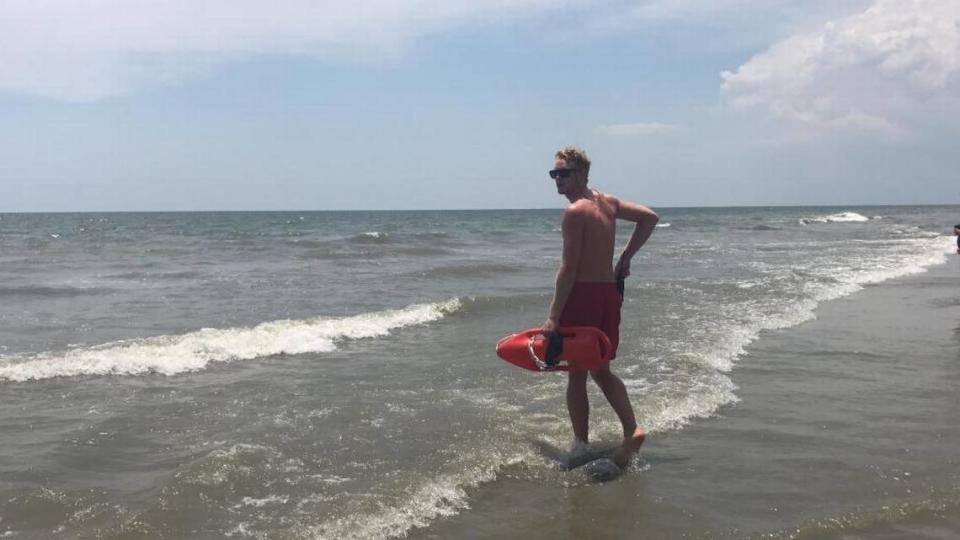Here are 6 ways to avoid being a shark snack in SC waters this summer
If you’ve ever frequented a beach along coastal South Carolina, you’ve probably been near a shark and might not have even known it.
“They are there most of the time. We don’t see them because the water is murky, but they are there. You know, that’s where they are supposed to be. They live in the ocean and they feed in that surf zone because there is bait in that surf zone,” Bryan Frazier, the principal investigator of shark research for the South Carolina Department of Natural Resources, previously told The Island Packet.

Although this may alarm some, typically this is not a cause for concern.
The presence of sharks in the area, big or small, should come as no surprise as this is their natural habitat. Yet, individuals still fear having any proximity to these toothy fish.
Luckily, sharks don’t have much of an interest in us.
“None of them want to bite people. We’re not on the menu. So, even if you’re swimming further off, you’re undoubtedly swimming past sharks all the time, but they aren’t interested in us as a food source,” Frazier said.

What to avoid to keep from attracting a shark
A bite from a nearby shark is “such a random occurrence” that South Carolina averages about four bites per year, according to Frazier.
“In the summer months, there are probably hundreds of thousands of people in the water every day, right? So, it’s just an incredibly rare occurrence,” he said.
However, there are recommendations on how to avoid attracting a shark and keep in from investigating closer to you.
Avoid wearing shiny clothing and objects that might appear like a fish flashing in the water.
Avoid swimming in and around schools of bait where sharks may be feeding or come to feed. A good indicator is if shorebirds are diving into the water nearby.
When swimming in the surf or offshore, people should stay in groups and not swim alone. Sharks are more likely to approach an unaccompanied individual.
Avoid swimming near someone who is fishing from or near the beach.
Don’t swim too far from shore.
Avoid splashing around in the water.
Don’t swim at dusk or dawn.
Sound, color and blood were listed as primary alluring components for sharks by the National Oceanic and Atmospheric Administration (NOAA). Yellow, white, and silver colors were recorded to seemingly attract sharks as opposed to dull colors.

Which sharks are the most dangerous?
The most dangerous species in order of documented attack records, according to NOAA, are:
Great white shark.
Bull shark
Tiger shark.
Grey nurse shark.
Lemon shark.
Blue shark.
Sand tiger shark.
Several species of hammerhead sharks.
Mako shark.

What to do if you spot a shark in the water with you
“There is no need to panic, but if you see one and you’re nervous, certainly it doesn’t hurt to get out of the water,” Frazier said. “You’re definitely going to improve your chances of not getting bitten, of course, if you’re not in the water, but there’s no reason to panic if you see a shark swimming in the surf area.”
“If you see them, and you’re nervous about it, just calmly exit the water, but there’s no reason to panic or anything like that,” he concluded.
Although some beach-goers may be uncomfortable by the idea of a shark swimming nearby, these fish do inhabit the ocean and the surrounding coastal waters where humans are merely recreational visitors.
“You know, we’re going into their environment. So, just look around you. If you see fish jumping or a bird diving for the fish they’re feeding on, don’t go in there. Just stay out of the food chain,” said Dr. Kimberly Ritchie, an associate professor for the Department of Natural Sciences at the University of South Carolina at Beaufort (USCB).
“Don’t be part of the food chain because it’s just accidental biting,” Ritchie added, referring to sharks’ ‘test biting’ when feeding.
What to do if a shark bites you
If a shark were to bite you, the best thing you can do would be to stay calm.
Don’t panic, get to shore and get to a hospital, Ritchie said.
“It’s very, very, very rare if anything like that were to happen, but if you do see a shark coming close to you, always face it,” she said. “You hear to poke it in the snout, but remember that their teeth are right under the snout, so another sensitive area is the gills.”
Are there places you should avoid?
“Don’t swim in the rivers since it is murky, so that’s when accidents would start to happen,” Ritchie said, referring to coastal rivers that connect to the ocean. “Sharks can see you, I’ve been on many coral reefs, if they can see you they aren’t going to mess with you. It’s only if they mistake you for something. Rivers are not safe to swim in.”
How can we help protect them?
If you’re looking to get involved with helping promote shark advocacy or prioritizing conservation efforts, Frazier recommended two global groups.
Shark Advocates International works to protect sharks from unsustainable trade and is a nonprofit project of The Ocean Foundation that works to conserve sharks worldwide. The group works to provide leadership in advancing sound, science-based local, national, and international conservation policies, according to the nonprofit’s website.
Save Our Seas Foundation has been dedicated to protecting life in oceans worldwide, especially that of sharks and rays, since 2003. In the effort to protect our oceans, the foundation funds and supports research, conservation and education projects worldwide, reported the Save Our Seas website.

